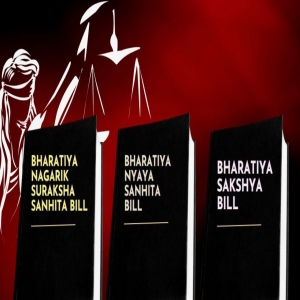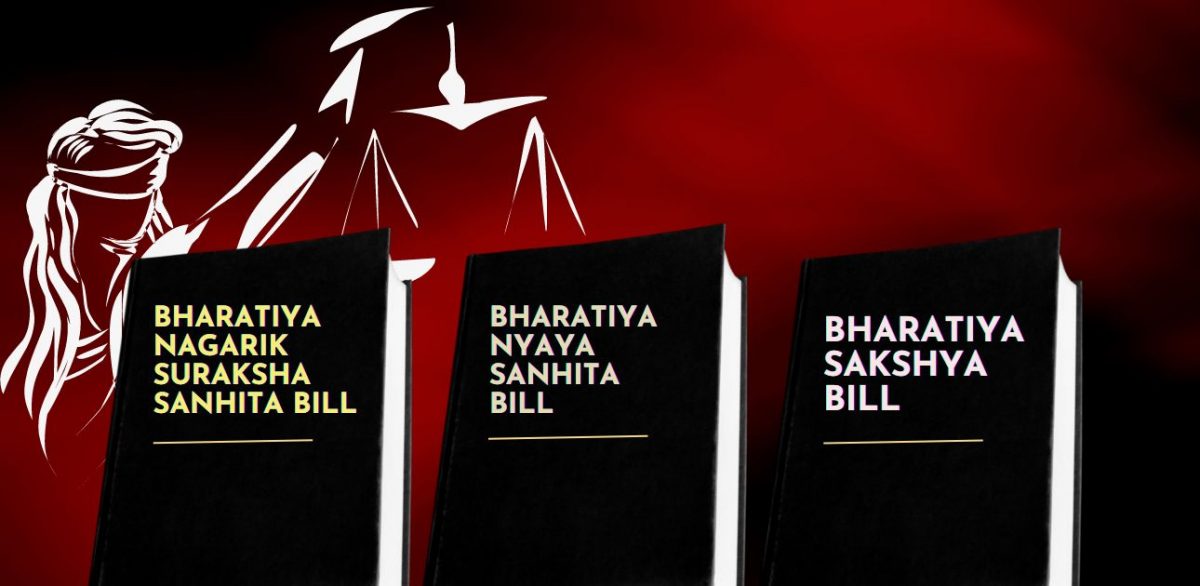
.png) Jaswant Kaur
Jaswant Kaur

July usually brings excitement, relief from the intense heat, and hope. However, this year, it came with significant changes in laws affecting every citizen of this country, as well as "any person on any ship or aircraft registered in India, wherever it may be, or any person in any place beyond India committing an offence targeting a computer resource located in India."
The newly enacted legislations—the Bharatiya Nyaya (Second) Sanhita (BNS) 2023, Bharatiya Nagrik Suraksha (Second) BNSS 2023, and Bharatiya Sakshya Adhiniyam (BSA) 2023—have replaced the Indian Penal Code (IPC) 1860, the Criminal Procedure Code (CrPC) 1973, and the Indian Evidence Act 1872, respectively, effective July 1.
While many of us are confused and scared after reading various articles about these new laws, a micro-blogging website X user claimed, "As the new criminal code, Bharatiya Nyay Sanhita, came into force today, the first FIR was filed against a street vendor for obstructing a road near the New Delhi Railway Station."
The same user posted a video showing the home minister refuting this, saying it was fake news: "The first case was registered in Gwalior, Madhya Pradesh. It was related to a motorcycle theft." No one would have thought that people would eagerly await, celebrate, or contest the first criminal report under the new law.
The fact remains that the law has changed despite the opposition from many. Contrary to the popular notion that these laws have been "Indianised" to replace colonial laws with a system based on justice and equity, they seem to promote colonialism, granting more power to the state and putting ordinary citizens at its mercy, with an anti-feminist agenda.
Since the Bills were tabled in Parliament, protests have been held against several provisions, yet they were passed without significant changes. If one examines the term "gender," it appears only once in the definitions section of the BNS. Although the word "transgender" is included, the provisions do not seem to promote gender equity or justice.
The law has a special chapter – Of Offences against Women and Children – even though the nature and sensitivity of crime against women and children are entirely different. Not only this, it says that women and children are vulnerable and do not have the capacity to exercise agency or autonomy and need state protection!
Another question that may raise many an eyebrow is that offences against women and children have been kept separate from "offences affecting human body" as if they are not humans!! If one goes deeper, one would realise that the patriarchal notion of man being the sole owner of a woman's body is being constantly promoted.
Despite several court judgments addressing marital rape, the law retains the old provisions under Section 375(2) and Section 376B of the IPC in the BNS under sections 63(2) and 67. It states that "sexual intercourse or sexual acts by a man with his own wife is not rape," against the recommendations of the Justice Verma Committee. This denies women freedom of choice in sexual relations. Ironically, England, where the concept of marital rape exception originated, repealed this provision in 1991. However, we have retained it in the so-called modernised procedural and substantive law.
Furthermore, women are denied the right to decide whether to bear a child. The law criminalises miscarriage unless done in good faith to save the woman's life. Section 88 states, "Whoever voluntarily causes a woman with child to miscarry, shall, if such miscarriage be not caused in good faith for the purpose of saving the life of the woman, be punished with imprisonment of either description for a term which may extend to three years, or with fine, or with both; and, if the woman be quick with child, shall be punished with imprisonment of either description for a term which may extend to seven years, and shall also be liable to fine."
This undermines the progress made in recognising women's reproductive rights. The Supreme Court has held that every woman has the right to make reproductive choices without undue interference from the state, but the law seems to ignore such judgments, promoting the identity of a woman with her child.
Regarding intimate partner violence, the former section 498A of the IPC, which dealt with cruelty by a husband and his relatives to a married woman, has been retained. Despite the insufficiency of these provisions, which led to the promulgation of the Protection of Women from Domestic Violence Act (PWDVA) 2005, the new law reproduces section 498A without broadening its scope. It does not account for women in live-in or non-marital domestic relationships, providing relief only to married women.
Women have historically faced difficulty in filing FIRs in cases of domestic violence. The police often force victims into mediation despite signs of physical violence. The BNS attempts to address this through sections 198, 199, and 200, which allow complaints against erring police personnel. However, the question remains whether a woman struggling for justice will have the energy to file a criminal complaint against the police.
For other heinous crimes like rape, custodial rape, gang rape, and aggravated forms of rape, most of the older provisions are retained. However, section 69 has caused concern among men who fear women will misuse it to file cases if they break up with their partners.
The section states, "Whoever, by deceitful means or by making a promise to marry a woman without any intention of fulfilling the same, has sexual intercourse with her, such sexual intercourse not amounting to the offence of rape, shall be punished with imprisonment of either description for a term which may extend to ten years and shall also be liable to fine."
While the provision seems draconian, the question is how many women will have the courage to file a case, given the re-victimisation they often face during trials. Many women suffer silently, considering their children or finances, and stay silent.
Although the laws have changed, our law enforcement agencies and judiciary remain the same, with the same limitations in personnel, training, and machinery for justice delivery. Whether under BNS or IPC, justice and equity remain elusive for women.